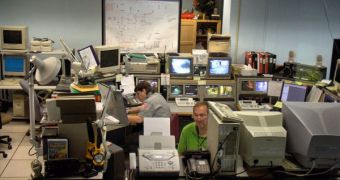Closed-circuit television (CCTV) is blamed by many as an affront to the privacy of decent and honest citizens, despite the fact that authorities praise it as an effective means of catching crooks and criminals. To calm some of the protests on CCTV, scientists at Hewlett-Packard have devised a method of “concealment,” that blurs the faces of people caught on pictures or film, alongside tracked individuals. The new method relies heavily on GPS systems, mounted on cell phones or PDAs, that tell a central computer where the subscriber to the new program is.
Basically, in order for people who wish to keep their privacy to have their face blurred, they would have to mount a specific GPS beacon on one of their devices. The cameras would pick up their image, but an additional signal coming from the positioning device would interfere with that image and render that person's face as a blur on computer screens and security tapes. In order to benefit from the new program, future participants will have to register with authorities, and most likely also pay a fee, like a yearly subscription.
According to the team at HP, the system they have devised is so good that it even works in crowds, where blurring only small portions of images is notoriously hard to do. The state-of-the-art computer software, which is able to interpret massive amounts of data in real time, is responsible for this accomplishment.
On the other hand, social activists maintain that this system is redundant, simply because no one should have to pay to have their privacy remain intact. “People shouldn't have to opt in to get privacy protection. And this system actively invades your privacy because it tells the service where you are at all times. I don't think its objectives are right at all,” Oxford Internet Institute privacy analyst Ian Brown, from the United Kingdom, says.
The expert adds that numerous states in the US have no legislation that prevents CCTV operators from passing on their recordings, whereas in Europe there are strict rules in place to prevent just that. In addition, he draws attention to the fact that surveillance technology is currently evolving at a pace that leaves little time for people to consider its implications on freedom and privacy.

 14 DAY TRIAL //
14 DAY TRIAL //